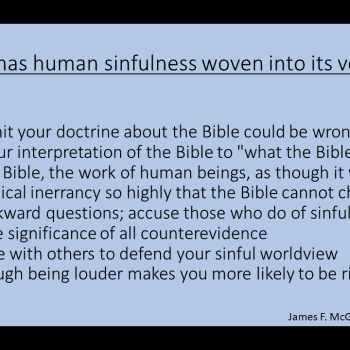 I avoided using the technical term for the viewpoint I am discussing here in the title. Those who’ve studied theology will know that the sort of view of the end times reflected in the Left Behind series and other such books is premillennial dispensationalism. But since most premillennial dispensationalists don’t know that they are premillennial dispensationalists, I thought I had better use terminology that might be more familiar.
I avoided using the technical term for the viewpoint I am discussing here in the title. Those who’ve studied theology will know that the sort of view of the end times reflected in the Left Behind series and other such books is premillennial dispensationalism. But since most premillennial dispensationalists don’t know that they are premillennial dispensationalists, I thought I had better use terminology that might be more familiar.
Today in the Sunday school class I teach, we finished our study of Romans and turned our attention to something new: the Book of Revelation. I presented four widely held views of what the book is about, and explained them. I also shared that Revelation 17:9-10 was decisive in changing my mind about the book and freeing me from the end times view that reads the Book of Revelation looking for correlations with the latest news.
This calls for a mind with wisdom. The seven heads are seven hills on which the woman sits. They are also seven kings. Five have fallen, one is, the other has not yet come; but when he does come, he must remain for only a little while.
The question I left them with is this: when is that statement in Revelation 17:10 true?
On what basis can anyone claim that the present tense John wrote is anything other than a reference to a state of affairs existing in his time?
The alternative is perhaps to say that it suddenly becomes true when Hal Lindsey, or Tim LaHaye, or someone else “cracks the code.”
But note what they then have to do. They have to say that the Roman Empire will be reestablished (Rome is the city with seven hills), that the Temple in Jerusalem will be rebuilt, and many other things will have to take place, simply to get the future situation they insist the book refers to replicate the situation in the author’s time.
Is it not preferable instead to treat the book as referring to things in the author’s time? That is, after all, what the Book of Revelation itself says.

It can be hard to change one’s view of the Book of Revelation – especially when doing so implies that you individually/your country are not the pinnacle of human history and central to a climactic end-times drama. But doing so has the advantage of taking seriously what the Bible actually says.
If you were once an end-times apocalyptically-focused Christian, what changed your mind?
Let me close with an amusing anecdote from the Sunday school class today. When I asked what people have heard about the Book of Revelation, one person who is not a native speaker of English wanted to say that people say it is about the Rapture, but it sounded like he was saying “Raptor” which of course is amusing considering the prominent place the Beast has in it.















